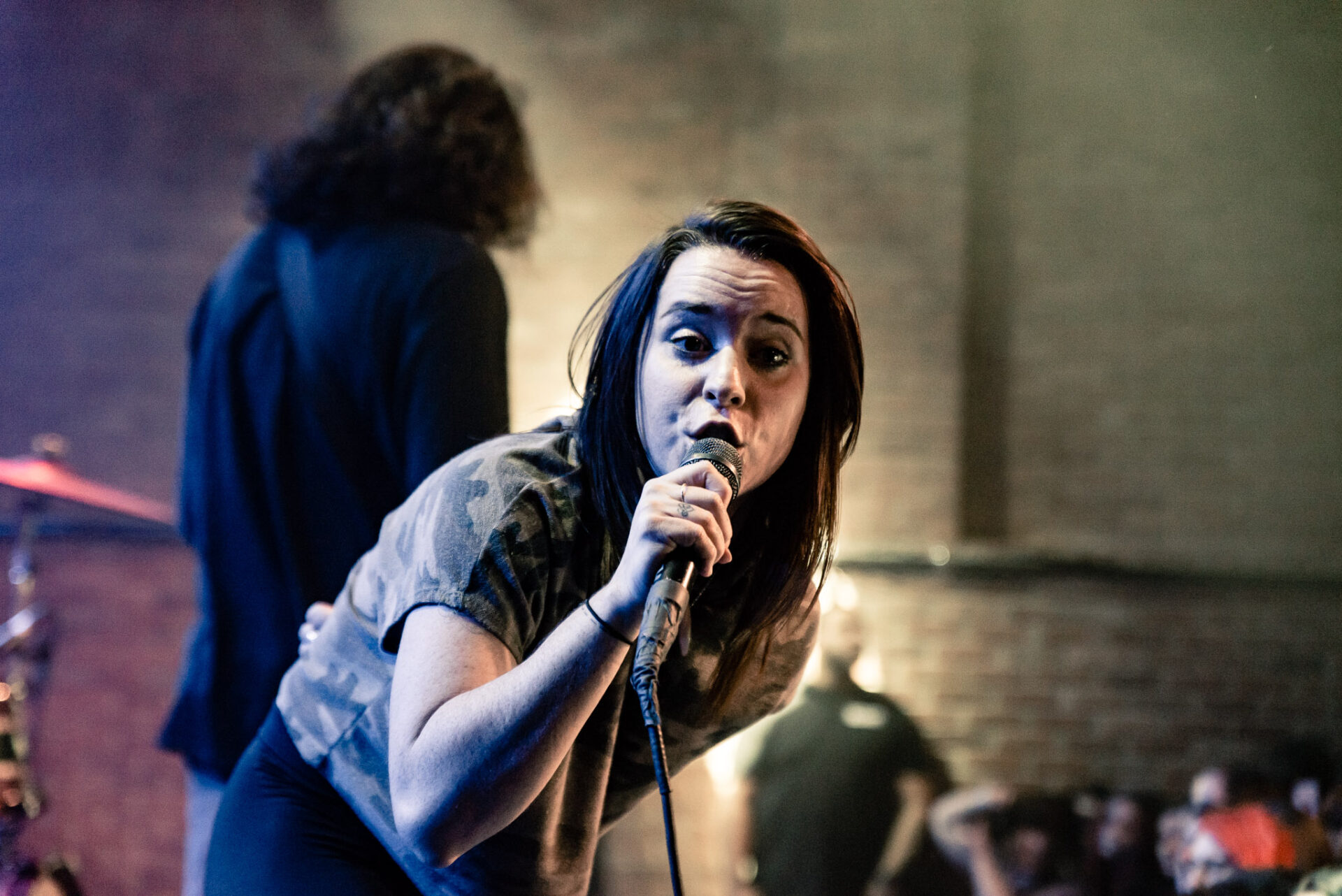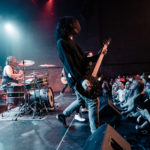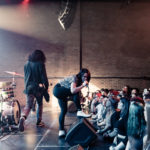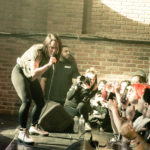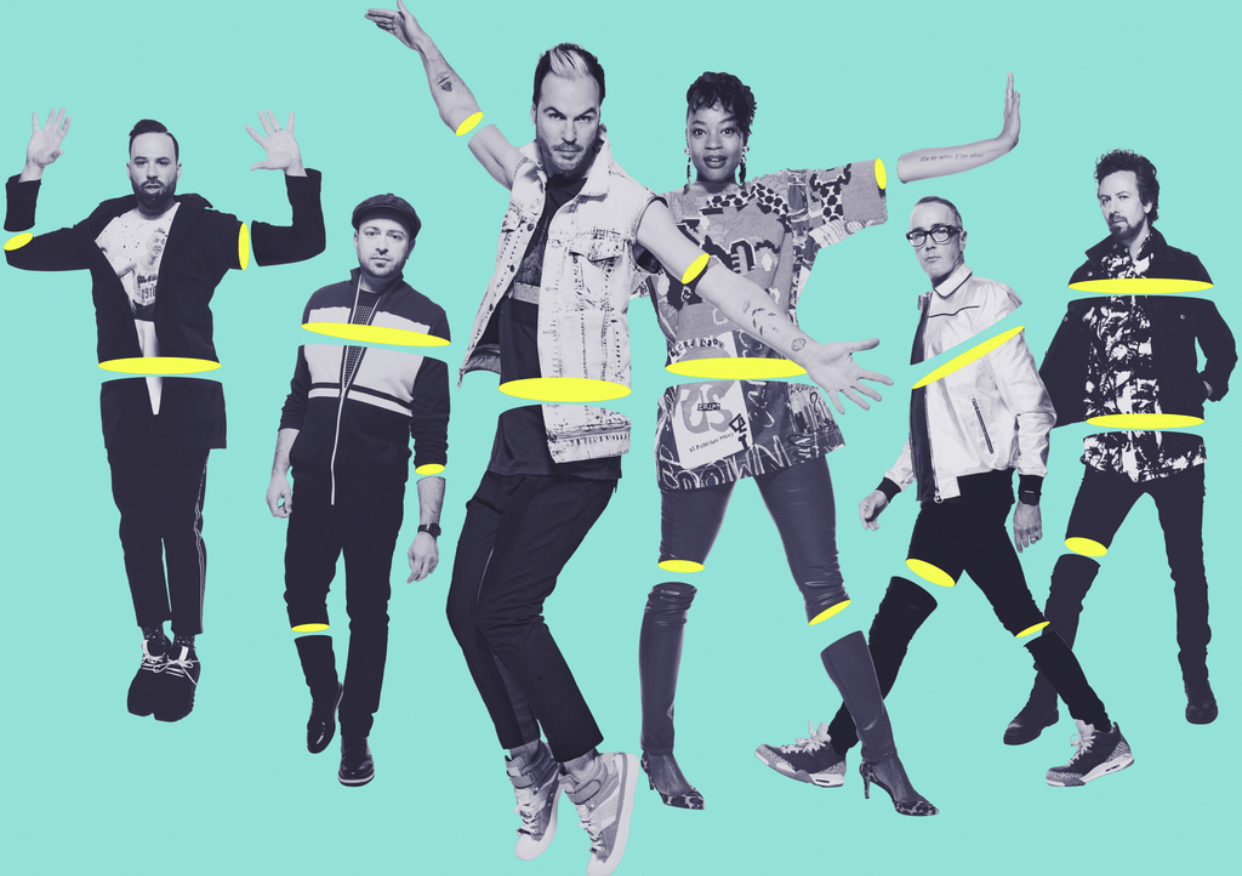When Sharptooth gets on stage, everyone pays attention.
Currently on “The Great Depression Tour” with As It Is, their set at New Jersey’s House Of Independents began with “Life On The Razor’s Edge.” It’s a new song – and to most in the crowd, the Baltimore group are a new band – but there’s something magnetic about seeing Sharptooth perform. Maybe it’s their lyrics, which confront things many of us would rather avoid (“Blood Upon Your Hands” addresses the stigma against mental illness; “Pushing Forward” talks about coming about; “Fuck You Donald Trump” attacks our political state). Maybe it’s the fact that frontwoman Lauren Kashan is outspoken in her beliefs on stage (“I know I’m talking a lot… but until I’m not the only woman up here, I’m gonna keep being a big old bitch,” she said in reference to men telling her she’s over-emotional or dramatic). Either way, there’s no denying that Sharptooth has something to say – and you better listen.
A metalcore band on a pop-punk tour may seem out of place, but Kashan says the current tour is “one of my favorite club tours in a really long time.” Past tours – like their fall run with Cane Hill – saw the band in front of “a bunch of metal dudes”; now, she’s able to get up in front of an audience “who look like me and who I relate to.” While As It Is’ fans are often unfamiliar with metal and hardcore music, their reception to Sharptooth’s set has been “so insanely positive”: these fans are primarily young women and teenagers who have a progressive mindset and are generally in tune and concerned with issues related to gender, identity, and social justice – themes consistent throughout Sharptooth’s music.
Kashan knows what it feels like to not be surrounded by people who look like you: before joining Sharptooth, she had been an active member of the local music scene, though she rarely met other women at shows. “I was the Baltimore mosh scene’s token girl for a long time,” she says, and shares that “there were maybe one or two other girls that I would see at shows across the East Coast.” It means a lot to be playing in front of a crowd of people “who, like – the content is very much for them,” and it’s rewarding to see that listeners who had previously not been interested in metal or hardcore music are now loving a style of music as it’s been made more accessible to them.
Though they’re now signed to Pure Noise Records and regularly touring through large rooms, it wasn’t long ago that Sharptooth were playing basement and DIY venues. The shows are larger and more “official” now, but there’s never a struggle in maintaining their message at more “corporate” venues because “there’s still nothing corporate whatsoever about Sharptooth and about what we do.” No matter what type of venue they’re playing or who’s in charge, Kashan has no holds barred in climbing on speakers or staircases and “piss[ing] off their sound guys, doing shit that no one else has any business doing in that venue.” Playing at proper venues has been “an even better conduit for our message” because with a proper sound system, “you can actually hear me.” This isn’t the first time Kashan and her bandmates have been asked about playing in a more “corporate” or “official” environment”; it was brought up while they were on Warped Tour, too, yet she feels it would be “idiotic” of the band not to use “this incredibly expansive platform” to continue speaking up.
Whether she’s writing about being cat-called (“Can I Get A Hell No”), sexual assault (“Left 4 Dead”), or mental health (“Blood Upon Your Hands”), Kashan is always direct in her lyrics. She’ll also regularly take the time between songs to talk to the crowd, either about a song or about something on her mind. The stage has always been “a very comfortable place” for her to express feelings, whether that’s through a character in a musical (she has a background in theater) or a song she’s written (while in art school for vocal performance, she was on a stage “literally every week”). When it comes to expressing her beliefs, “the method is almost totally unimportant,” taking a back seat to what it is she has to say.
For someone who sees Sharptooth and wants to get involved with fighting for justice and making the world a better place, there are plenty of options. Kashan suggests starting a band, blogging, creating visual art, or hosting a podcast (she recommends her friend’s show, The Gaytheist Manifesto, for anyone interested in learning about the intersectionality of queerness and atheism. Whatever you choose to do, it’s important to come together with others who are having similar experiences so that you can “help to elevate each other so that your art is more visible and that more people are feeling seen and included.” There are also “so many amazing organizations” that anyone can get involved with by volunteering, tabling, or making donations. Sharptooth is joined on “The Great Depression Tour” by The Art of Survival, a non-profit and art-collective that makes resources “for virtually anything you can think of,” from sexual violence to eating disorders to LGBT issues, easily accessible on a well-designed website.
That accessibility is essential to making sure people get the help that they need. Kashan knows that she’s “unbelievably fortunate” to have the means to afford the specific therapist she works with – someone who specializes in art therapy and works with trauma survivors – but “it shouldn’t just be rich white kids like me who can afford to go to such a great therapist.” Some people are lucky to have access to treatment through college, or to be able to afford great insurance; however, not everyone knows where to look when they need help. She stresses the importance of putting institutions in place to help us take care of each other, and is frustrated by the lack of value seemingly placed on human life in this country. “It’s amazing [that] these are the battles that we’re having across political aisles,” she says. “There’s people who want to fight for the rights of an unborn fetus, but who don’t care if the 20-something-year-old, or the 40-something-year-old, can afford to eat or get therapy or take care of their bodies.”
Without a regular eating and sleeping schedule, touring exacerbates Kashan’s mental health issues. She deals with post-traumatic stress disorder, seasonal affective disorder, and depression; that, combined with being away from loved ones and having abandonment issues can make touring “a fucking hot mess, honestly,” as finding balance is “a huge struggle.” Although the UK has a hotline through Help Musicians UK[helpmusicians.org.uk] called Music Minds Matter that touring musicians can reach out to for help, there’s no similar crisis resource in the US – and that’s a problem. She reflects on the number of touring musicians that have overdosed or died by suicide (“I know I’m not the only person who’s dealing with this shit”), sharing a hope that having crisis resources available in the moment could make a huge difference for those who need intervention.
Songwriting and getting up on stage can be therapeutic, though it doesn’t replace adequate professional help. It’s also a misconception that someone who appears confident and strong-willed isn’t fazed by talking openly about their personal struggles, as performing and being on the road can also be “very trying and difficult” – and it’s okay that it’s both. Midway through their set came “No Sanctuary”, a confrontation to those whose hateful opinions make for a hostile environment (“Every time that you say ‘faggot’ / Is a bullet through my head”), which Kashan introduced by saying, “I hope that you are making your music scene a safe place because out there, there is no fucking sanctuary.”
Getting up on stage in front of so many women has made Kashan feel “so much more validated and secure and safe and heard.” In contrast, it’s “way fucking harder” to play in front of “a room full of dudes staring at me like I’m in front of a firing squad and talking about being raped.” On recent tours, she began to dread playing. She didn’t want to talk about these issues in front of people she felt weren’t naturally predisposed to like her or care about what she had to say; some of them even reminded her of her abuser (“I’m worrying about, like, if somebody who has assaulted me is going to show up at the show,” she admits). However, performing is “one of the only things that gave my life meaning,” so she would hold on to the hope that perhaps someone in the room might feel seen, heard, and validated by what she had to say. Going forward, she’s glad to have met so many new fans and new friends that will come back to see Sharptooth the next time they’re on tour. Regardless of what crowds future tours bring, if these new faces are coming back, “fuck yeah, I’m trying to do this for them, like- let’s go!” She’s eager to see younger girls show up for their set, and is “so stoked” that Sharptooth is “some of these people’s gateway metalcore band. I think that’s so awesome.”
Following the 2017 release of their debut album Clever Girl, Sharptooth has begun working on new music with Brian McTernan (Circa Survive, Senses Fail, Scary Kids Scaring Kids, Angel Dust, Turnstile). After “The Great Depression Tour” ends, they’ll go home to finish writing and recording. So far, the band have done “a couple of like, riffing and writing sessions” to mess around with vocals; Kashan is normally very self-conscious in the studio, but McTernan has made it “such a fun and wonderful experience.” The new material is “bad, and it is not pulling punches.” She’s grown more confident in writing with “a little bit more ambiguity,” so she can dig beneath traumatic experiences to show what’s underneath and the parts of her that have been born of it.
Revealing what’s going on “literally inside me as a result” of trauma has her feeling emotionally naked. “Life On The Razor’s Edge” is about “that tightrope that we walk between protecting ourselves and being vulnerable,” asking, “If love is the answer, then why does it cut us so deep?”. Being emotionally open can be “this wonderful, incredible thing” since it allows you to be close to people, but “it can also fucking destroy you. It can be incredibly devastating as well.” Sometimes, life throws unpredictable situations our way; perhaps we define ourselves not by what happens to us but by what we do with it and the choices we make. The next Sharptooth record will deal largely with “that internal turmoil and the ways that that makes us human.”
While many people are eager to hear what Sharptooth has to say, “a lot of people are not receptive to women with opinions, just in and of itself.” There’s a lot of misogyny in the world: women will be called “difficult” for speaking their mind, and men will take issue with them “just… existing in this scene.” Kashan writes about issues like gender and identity and sexuality because that’s her reality, and won’t let those who aren’t willing to listen prevent her from having a seat at the table. Furthermore, “there’s a lot of lip service in the hardcore scene”: people will easily come across as “woke” or “PC” online but fail to do anything about it. “At the end of the day if you aren’t making deliberate choices to help raise up marginalized voices – then are you actually helping, or doing the work for literally anybody? I don’t think so.”
Some people may dismiss Sharptooth – or any band who’s outspoken, or any group with a woman in it – as “corny.” As a woman especially, Kashan is aware that speaking up can be detrimental to “success” in the music industry, but she doesn’t care – it was never about being “big”, rather about doing something that she’s passionate about: “I was content to play basement shows until I died, so [if] people think I’m corny, they can go fuck themselves. You know what’s really corny? Caring more about clout than people’s lives. Because at the end of the day, that’s what this is about – it’s about people’s lives and people feeling valued and cared for, and being able to express themselves in music, so I’m sorry if that doesn’t look a certain way – it must be nice to be able to get on stage every day and say nothing, but that’s just never going to be me, and that’s fine.”
If someone is a hateful person or has a differing opinion, Kashan encourages them to come to a show anyway; perhaps they’ll change their mind. “This is a band for all people,” she states. “I don’t believe in cancel culture – that’s not a thing that I subscribe to – I believe in hiatus culture, like, ‘we gonna put you on a backburner, you get your shit together, and then maybe you can come back and do right.’ But I don’t believe in writing people off entirely because I don’t think that it encourages anyone to look at their behavior.” Every single of us is “implicit in some way in the oppression of others, period,” and no one gets better when they’re in denial of their behavior. We all start somewhere and have made mistakes; Kashan is firm that “no one is born ‘woke.’” She continues that, ”If there’s something I want anyone to know about this band, it’s that no matter where you are in that learning process, we’re here for you. As long as you’re not looking at your behavior and going, ‘Yeah I don’t really give a shit, fuck you’ – then we’re here. Let’s all fucking evolve together. That’s what this is about.”
- Photo by Molly Hudelson
Musicians in the UK can reach Music Minds Matter 24/7, free of charge, at 0808 802 8008. In the US, anyone can call 1-800-273-TALK if they’re in crisis.
Keep up with Sharptooth on Facebook, Twitter, Instagram, and their website.

